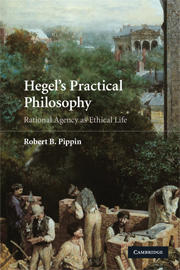2 - Naturalness and mindedness: Hegel's compatibilism
Published online by Cambridge University Press: 05 June 2012
Summary
The problem of freedom in modern philosophy has three basic components: (i) what is freedom, or what would it be to act freely? (ii) Is it possible so to act? (iii) And how important is leading a free life? As the last question indicates, the issues concern both a philosophical question and a human aspiration. And the questions are also obviously linked; one can aspire to a sort of freedom that is a philosophical fantasy, not possible; a true theory of freedom might reveal that the importance attributed to a free life in Western modernity is misplaced.
An affirmative answer to the third question, such that freedom is the most important dimension of a worthy life, provokes two others besides the obvious one (why should it be so important, when compared, say, to piety or security?): what sort of political order and social system best realizes such a capacity, or both allows and makes more likely that individuals can act as free subjects? And there is the historical question mentioned in chapter 1 – what is the unique importance of freedom in the modern Western epoch in philosophy?
Hegel's “philosophy of objective spirit” comprises his answer to the former question. He gave the most ambitious and speculative answer in the history of philosophy to the second. And he proposed unprecedented and highly controversial answers to the three main questions.
I suggest with Hegel that what we want to be able to explain when we ask “what is freedom?” are the conditions that must be fulfilled such that my various deeds and projects could be, and could be experienced by me as being, my deeds and projects, as happening at all in some way that reflects and expresses my agency.
- Type
- Chapter
- Information
- Hegel's Practical PhilosophyRational Agency as Ethical Life, pp. 36 - 64Publisher: Cambridge University PressPrint publication year: 2008
- 1
- Cited by

